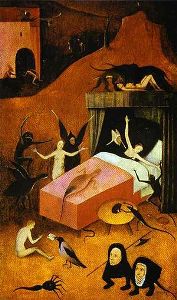Difference between revisions of "Reprobate"
(Created page with 'File:lighterstill.jpg ==Origin== Classical Latin reprobātus (see reprobate adj.). Compare post-classical Latin reprobus person who has been predestined by God t...') |
m (Text replacement - "http://" to "https://") |
||
| (One intermediate revision by one other user not shown) | |||
| Line 1: | Line 1: | ||
| − | [[File:lighterstill.jpg]] | + | [[File:lighterstill.jpg]][[File:BoschDeathOfTheReprobate.jpg|right|frame]] |
==Origin== | ==Origin== | ||
| − | Classical Latin reprobātus (see reprobate adj.). Compare post-classical Latin reprobus [[person]] who has been [[predestined]] by [[God]] to [[eternal]] [[damnation]] (late 2nd or early 3rd cent. in [ | + | Classical Latin reprobātus (see reprobate adj.). Compare post-classical Latin reprobus [[person]] who has been [[predestined]] by [[God]] to [[eternal]] [[damnation]] (late 2nd or early 3rd cent. in [https://en.wikipedia.org/wiki/Tertullian Tertullian] as reprobi, plural), use as noun of [[masculine]] of classical [[Latin]] reprobus |
| − | *[ | + | *[https://en.wikipedia.org/wiki/16th_century 1545] |
The [[English]] [[word]], reprobate, is from the [[Latin]] root probare (English: prove, test), and thus derived from the Latin, reprobatus ([[reproved]], [[condemned]]), the opposite of approbatus (commended, [[approved]]). | The [[English]] [[word]], reprobate, is from the [[Latin]] root probare (English: prove, test), and thus derived from the Latin, reprobatus ([[reproved]], [[condemned]]), the opposite of approbatus (commended, [[approved]]). | ||
==Definitions== | ==Definitions== | ||
| Line 11: | Line 11: | ||
*3: [[expressing]] or involving reprobation | *3: [[expressing]] or involving reprobation | ||
==Description== | ==Description== | ||
| − | '''Reprobation''', in [[Christian]] [[theology]], is a corollary to the [ | + | '''Reprobation''', in [[Christian]] [[theology]], is a corollary to the [https://en.wikipedia.org/wiki/Calvinism Calvinistic] [[doctrine]] of unconditional [[election]] which derives that some of [[mankind]] ([[Chosen People|the elect]]) are predestined by [[God]] for [[salvation]]. Therefore, the remainder are left bound to their fallen [[nature]] and [[eventually]] to [[eternal]] [[damnation]]. This same state of unbelief is also known as reprobation. In Calvinist [[terminology]], the non-elect are often referred to as the '''reprobate'''. Similarly, when a sinner is so hardened as to feel no remorse or misgiving of [[conscience]], it is considered as a sign of reprobation. |
[[Category: Religion]] | [[Category: Religion]] | ||
Latest revision as of 02:28, 13 December 2020
Origin
Classical Latin reprobātus (see reprobate adj.). Compare post-classical Latin reprobus person who has been predestined by God to eternal damnation (late 2nd or early 3rd cent. in Tertullian as reprobi, plural), use as noun of masculine of classical Latin reprobus
The English word, reprobate, is from the Latin root probare (English: prove, test), and thus derived from the Latin, reprobatus (reproved, condemned), the opposite of approbatus (commended, approved).
Definitions
- 3: expressing or involving reprobation
Description
Reprobation, in Christian theology, is a corollary to the Calvinistic doctrine of unconditional election which derives that some of mankind (the elect) are predestined by God for salvation. Therefore, the remainder are left bound to their fallen nature and eventually to eternal damnation. This same state of unbelief is also known as reprobation. In Calvinist terminology, the non-elect are often referred to as the reprobate. Similarly, when a sinner is so hardened as to feel no remorse or misgiving of conscience, it is considered as a sign of reprobation.
